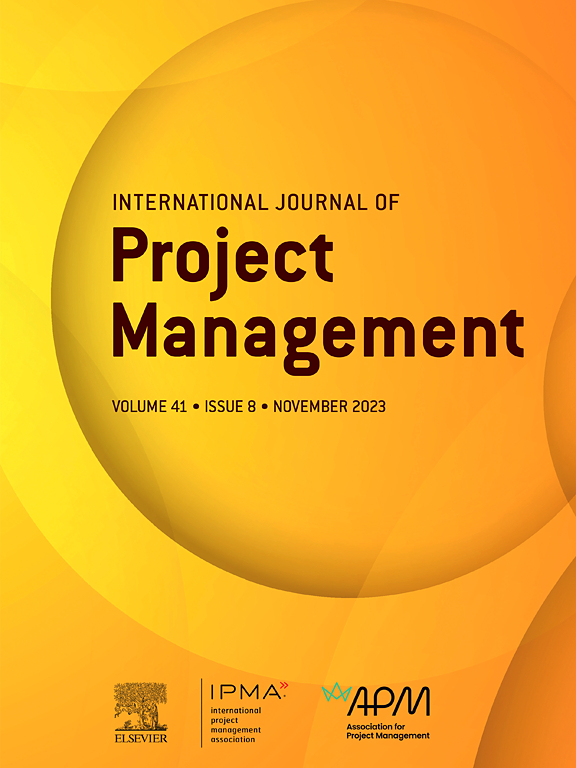组织和团队氛围如何促进项目成功的设计思维
IF 7.5
1区 管理学
Q1 MANAGEMENT
International Journal of Project Management
Pub Date : 2025-04-01
DOI:10.1016/j.ijproman.2025.102711
引用次数: 0
摘要
传统的项目管理方法与现代创新项目的不确定性和复杂性作斗争。研究强调需要灵活的方法来整合探索和学习,比如设计思维。然而,在项目管理中实施设计思维实践面临着各种障碍。除了结构和战略障碍之外,组织环境——特别是个人如何体验工作环境——可能在塑造此类实践的强度和成功方面起着关键作用。本研究分析了支持实施设计思维实践以增加项目成功的组织和团队氛围,同时考虑了项目突发事件的作用。利用来自93家公司的379个项目的数据,我们调查了组织气候(支持性气候、创新气候、开放气候)和团队气候(服务型领导、团队自治)的影响。我们的研究结果表明,设计思维实践可以提高项目的成功率。同时,我们认为支持性的氛围、开放的氛围、服务型领导和团队自治有利于设计思维实践。此外,当项目创新性较高时,设计思维实践更有利于项目的成功。项目创新性也加强了支持性环境对设计思维实践的影响。我们对项目管理和设计思维的文献做出了贡献,提供了第一个定量证据,证明了更广泛的组织背景下的特定气候条件如何支持设计思维实践在项目环境中的应用。本文章由计算机程序翻译,如有差异,请以英文原文为准。
How organisational and team climates foster design thinking for project success
Traditional project management methods struggle with the uncertainties and complexities of modern, innovative projects. Research highlights the need for flexible approaches integrating exploration and learning, such as design thinking. However, implementing design thinking practices in project management faces various obstacles. Beyond structural and strategic hurdles, the organisational context—specifically how individuals experience the work environment—likely plays a critical role in shaping the intensity and success of such practices. This study analyses the organisational and team climates that support implementing design thinking practices to increase project success while considering the role of project contingencies. Drawing on data from 379 projects nested in 93 companies, we investigate the impact of organisational climates (supportive climate, innovation climate, open climate) and team climates (servant leadership, team autonomy). Our findings suggest that design thinking practices improve project success. At the same time, we identify a supportive climate, an open climate, servant leadership, and team autonomy as conducive to design thinking practices. In addition, design thinking practices are more beneficial for project success when project innovativeness is high. Project innovativeness also strengthens the effect of a supportive climate on design thinking practices. We contribute to the literature on project management and design thinking by providing the first quantitative evidence on how specific climate conditions within the broader organisational context support the application of design thinking practices in project environments.
求助全文
通过发布文献求助,成功后即可免费获取论文全文。
去求助
来源期刊

International Journal of Project Management
MANAGEMENT-
CiteScore
12.30
自引率
26.20%
发文量
83
审稿时长
59 days
期刊介绍:
The International Journal of Project Management is recognized as a premier publication in the field of project management and organization studies. Our main objective is to contribute to the advancement of project management and project organizing through the publication of groundbreaking research.
We are dedicated to presenting fresh insights and new knowledge in various domains, including project management, program management, portfolio management, project-oriented organizations, project networks, and project-oriented societies. We actively encourage submissions that explore project management and organizing from the perspectives of organizational behavior, strategy, supply chain management, technology, change management, innovation, and sustainability.
By publishing high-quality research articles and reviews, we strive to revolutionize the academic landscape and propel the field of project management forward. We invite researchers, scholars, and practitioners to contribute to our journal and be a part of the progressive development in this exciting field.
 求助内容:
求助内容: 应助结果提醒方式:
应助结果提醒方式:


